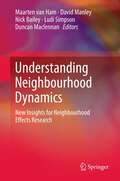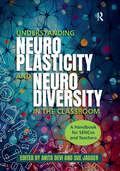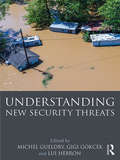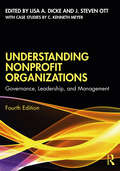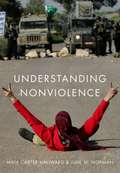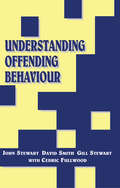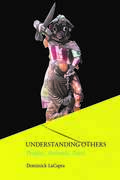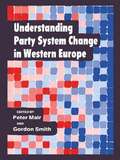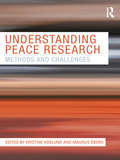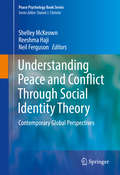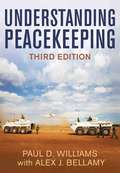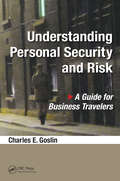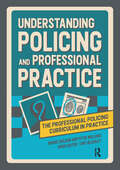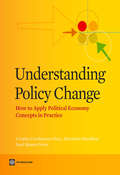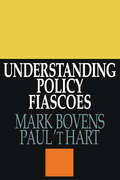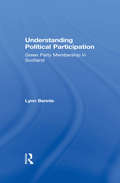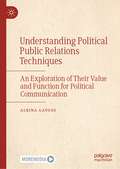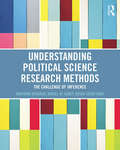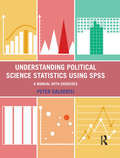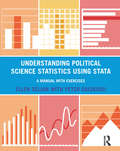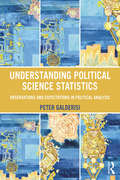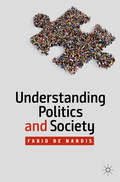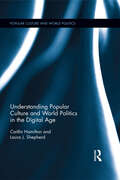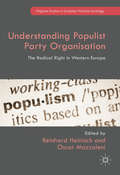- Table View
- List View
Understanding Neighbourhood Dynamics
by Nick Bailey Duncan Maclennan Ludi Simpson Maarten Van Ham David ManleyThis rare interdisciplinary combination of research into neighbourhood dynamics and effects attempts to unravel the complex relationship between disadvantaged neighbourhoods and the life outcomes of the residents who live therein. It seeks to overcome the notorious difficulties of establishing an empirical causal relationship between living in a disadvantaged area and the poorer health and well-being often found in such places. There remains a widespread belief in neighbourhood effects: that living in a poorer area can adversely affect residents' life chances. These chapters caution that neighbourhood effects cannot be fully understood without a profound understanding of the changes to, and selective mobility into and out of, these areas. Featuring fresh research findings from a number of countries and data sources, including from the UK, Australia, Sweden and the USA, this book offers fresh perspectives on neighbourhood choice and dynamics, as well as new material for social scientists, geographers and policy makers alike. It enriches neighbourhood effects research with insights from the closely related, but currently largely separate, literature on neighbourhood dynamics.
Understanding Neuroplasticity and Neurodiversity in the Classroom: A Handbook for SENCos and Teachers
by Anita Devi Sue JaggerA unique and innovative book for all teachers and SENCos that explores the intersection of neurodiversity and neuroplasticity in order to provide better outcomes for neurodivergent pupils.Neurodiversity involves an understanding that neurological differences should be honoured and respected. It is a strengths-based model based on the idea that people experience and interact with the world around them in many different ways, advocating that there is no single right way of thinking, learning, and behaving. In effect, neurodiversity can be used as a construct to understand those ‘labelled’ with a special educational need and disability. Neuroplasticity is the brain’s ability to change and adapt in response to experiences, especially important for children who struggle to learn.This book unravels how teachers can contribute to rewiring neural pathways to reshape as opposed to ‘fix’, demonstrating how making new connections in the brain enables pupils to realise their full potential. Rich with research, case studies, and thought-provoking questions, this book sheds light on an innovative and timely topic.As the demand for teacher support in this area grows, it helps practitioners identify alternative approaches for those who might need more personalised learning and teaching in the classroom.
Understanding New Security Threats
by Michel Gueldry Gigi Gokcek Lui HebronThis textbook examines non-traditional forms of security and expands the notion of security to include non-state actors and non-human actors. Proposing an expansive view of non-traditional forms of security that go beyond traditionally recognized issues of threats to state and national territory, this new textbook rests on the following premises: traditional state-centered threats, such as nuclear proliferation and espionage, remain a concern; old and new threats combine and create interlocking puzzles—a feature of wicked problems and wicked messes; because of the global erosion of borders, new developments of unconventional insecurity interact in ways that frustrate traditional conceptual definitions, conceptual maps, and national policies; unconventional security challenges which have traditionally been seen as "low politics" or "soft" issues are now being recognized as "hard security" challenges in the twenty-first century; many of the so-called "new" threats detailed here are in fact very old: diseases, gender violence, food insecurity, under-development, and crime are all traditional security threats, but deeply modified today by globalization. The chapters offer local and global examples and engage with various theoretical approaches to help readers see the bigger picture. Solutions are also suggested to these problems. Each chapter contains discussion questions to help readers understand the key points and facilitate class discussion. This book will be of great interest to students of international security studies, human security, global politics, and international relations.
Understanding Nonprofit Organizations: Governance, Leadership, and Management
by J. Steven Ott Lisa A. Dicke C. Kenneth MeyerThere are no easy solutions to the complexities faced by nonprofit leaders and managers. This textbook addresses the governance, leadership, and management functions of the thousands of organizations in the nonprofit sector that provide an enormous range of services. This thoroughly revised fourth edition of Understanding Nonprofit Organizations does not simply recount and summarize seminal literature; it presents 22 of the most important and informative articles, chapters, and essays written about the workings of nonprofit organizations, alongside 18 case studies that illustrate the complex governing, leading, and managing issues raised in the chapters. The introductions that open each of the sections explore important issues and concepts, provide context, and explain what students should be looking for as they read each of the chapters. Each section introduction has been extensively rewritten or updated to address recent movements and changes in the nonprofit field, including the impacts of the COVID-19 pandemic on all aspects of nonprofit organizations’ functions and ability to raise funds, increasing social and political divides within countries and communities, the gains and problems that have arisen with dramatic expansion of social media, and the need for justice, equity, diversity and inclusion in our organizations and our society. Understanding Nonprofit Organizations provides a cohesive set of relevant readings for a course on nonprofit organizations and management, and instructors and students will appreciate the original case studies that parallel the major themes presented. The book is also designed for individuals who are hoping or planning to move into paid or voluntary leadership and management positions in nonprofit organizations—as well as for those already involved with nonprofits seeking to improve their skills and understanding of their chosen field.
Understanding Nonprofit Organizations: Governance, Leadership, and Management
by C. Kenneth MeyerThere are no easy solutions to the complexities faced by nonprofit leaders and managers. This textbook addresses the governance, leadership, and management functions of the thousands of organizations in the nonprofit sector that provide an enormous range of services. This thoroughly revised fourth edition of Understanding Nonprofit Organizations does not simply recount and summarize seminal literature; it presents 22 of the most important and informative articles, chapters, and essays written about the workings of nonprofit organizations, alongside 18 case studies that illustrate the complex governing, leading, and managing issues raised in the chapters.The introductions that open each of the sections explore important issues and concepts, provide context, and explain what students should be looking for as they read each of the chapters. Each section introduction has been extensively rewritten or updated to address recent movements and changes in the nonprofit field, including the impacts of the COVID-19 pandemic on all aspects of nonprofit organizations’ functions and ability to raise funds, increasing social and political divides within countries and communities, the gains and problems that have arisen with dramatic expansion of social media, and the need for justice, equity, diversity and inclusion in our organizations and our society.Understanding Nonprofit Organizations provides a cohesive set of relevant readings for a course on nonprofit organizations and management, and instructors and students will appreciate the original case studies that parallel the major themes presented. The book is also designed for individuals who are hoping or planning to move into paid or voluntary leadership and management positions in nonprofit organizations—as well as for those already involved with nonprofits seeking to improve their skills and understanding of their chosen field.
Understanding Nonviolence: Contours and Contexts
by Maia Carter Hallward Julie M. NormanThe Combining insightful analysis of key theoretical debates with fresh perspectives on contemporary and historical case studies, it explores the varied approaches, aims, and trajectories of nonviolent campaigns from Gandhi to the present day. With cutting-edge contributions from leading scholars and practitioners in the field, this accessible and lively book will be essential reading for activists, students and teachers of contentious politics, international security, and peace and conflict studies.
Understanding Offending Behaviour
by David Smith John Stewart Cedric FullwoodBased on a survey of probation work with almost 1400 young adult offenders, this book provides a unique insight into the realities of probation practice in a context of increasing poverty, drug use and community breakdown. Starting with an outline of the current policy environment, the book discusses the relevance of criminological theory to the harsh experience of young offenders in modern Britain. It goes on to develop a typology of offending behaviour on the basis of detailed and often disturbing accounts of the histories and troubles of young people afflicted by poverty, disruption of family relationships and long term unemployment. While much of the book is concerned with the difficulties young offenders experience, and the problems probation officers have in trying to help them change, the overall message of the book is not one of despair. The authors show that good probation practice can make a difference, and the book is written in a way which will be useful to practitioners and policy-makers involved with supervising offenders in the community. From the typology of offending the authors extract lessons for appropriate and relevant practice which should help to improve the quality and effectiveness of the probation service. Some of these implications are explored in the concluding chapter, by Cedric Fullwood, Chief Probation Officer of Greater Manchester. As well as criminal justice practitioners, students of criminology, probation trainees and other social work students will find in the book many vivid examples of how sociological theory can be used to understand and interpret practice. The book is likely to provoke much debate about what constitutes positive practice in a probation service facing the challenges of the future.
Understanding Others: Peoples, Animals, Pasts
by Dominick LaCapraTo what extent do we and can we understand others—other peoples, species, times, and places? What is the role of others within ourselves, epitomized in the notion of unconscious forces? Can we come to terms with our internalized others in ways that foster mutual understanding and counteract the tendency to scapegoat, project, victimize, and indulge in prejudicial and narcissistic impulses? How do various fields or disciplines address or avoid such questions? And have these questions become particularly pressing and not in the least confined to other peoples, times, and places? Making selective and critical use of the thought of such important figures as Sigmund Freud, Jacques Derrida, and Mikhail Bakhtin, in Understanding Others Dominick LaCapra investigates a series of crucial topics from the current state of deconstruction, trauma studies, and the humanities to newer fields such as animal studies and posthumanist scholarship. LaCapra adroitly brings critical historical thought into a provocative engagement with politics and our current political climate. This is LaCapra at his best, critically rethinking major currents and exploring the old and the new in combination, often suggesting what this means in the age of Trump.
Understanding Party System Change in Western Europe
by Peter Mair Gordon SmithPublished in the year 1990, Understanding Party System Change in Western Europe is a valuable contribution to the field of Politics.
Understanding Peace Research: Methods and Challenges
by Kristine Hoglund Magnus ObergThis textbook provides a comprehensive overview of different methods and sources of information-gathering for peace and conflict students and researchers, as well as the challenges presented by such work. Research on conflict-ridden societies carries special challenges for the collection and evaluation of information about the conflict and its actors. First, due to the nature of information emerging, incentives to misrepresent and propaganda is common. News coverage is sometimes poor and reporting is often incomplete, selective and biased. Second, the sensitivity of the topic and the questions posed in peace and conflict research means that access to and the security of informants can be a problem. Peace and conflict research as a discipline encompasses a number of different approaches for obtaining empirical information which serve as a basis for analyzing various research topics. This book provides a comprehensive overview of different methods and sources of information-gathering for students and researchers, as well as the challenges presented by such work. It offers: tools for evaluating sources and information suggestions on where different types of information can be found advice on using different types of sources, including news reports and written narratives practical guidelines for constructing large-scale datasets insights and guidelines for comparative fieldwork, in-depth interviews, focus groups, and surveys? reflection and discussion on important ethical concerns in peace research This book will be of much interest for students and researchers of peace and conflict studies, conflict resolution, war and conflict studies, development studies, security studies and IR, as well as for NGO workers/researchers. Kristine Höglund is Associate Professor at the Department of Peace and Conflict Research, Uppsala University. She has a PhD in Peace and Conflict Research from Uppsala University Sweden (2004). She is author of Peacemaking in the Shadow of Violence. Magnus Öberg is Associate Professor at the Department of Peace and Conflict Research, Uppsala University, and Associate Editor of the Journal of Peace Research (since 2006). He has a PhD in Peace and Conflict Research from Uppsala University (2003) and is co-editor of Resources, Governance, and Civil Conflict (Routledge, 2008).
Understanding Peace and Conflict Through Social Identity Theory
by Neil Ferguson Shelley Mckeown Reeshma HajiThis volume brings together perspectives on social identityand peace psychology to explore the role that categorization plays in both conflictand peace-building. To do so, it draws leading scholars from across the worldin a comprehensive exploration of social identity theory and its application tosome of the world's most pressing problems, such as intrastate conflict,uprising in the middle east, the refugee crisis, global warming, racism and peace building. A crucial theme of thevolume is that social identity theory affects all of us, no matter whether weare currently in a state of conflict or one further along in the peace process. The volume is organized into two sections. Section 1 focuseson the development of social identity theory. Grounded in the pioneering workof Dr. Henri Tajfel, section 1 provides the reader with a historical backgroundof the theory, as well as its current developments. Then, section 2 bringstogether a series of country case studies focusing on issues of identity acrossfive continents. This section enablescross-cultural comparisons in terms of methodology and findings, and encouragesthe reader to identify general applications of identity to the understanding ofpeace as well as applications that may be more relevant in specific contexts. Taken together, these two sections provide a contemporary and diverse accountof the state of social identity research in conflict situations and peacepsychology today. It is evident thatany account of peace requires an intricate understanding of identity both as acause and consequence of conflict, as well as a potential resource to beharnessed in the promotion and maintenance of peace. Understanding Peace and Conflict Through Social Identity Theory: ContemporaryGlobal Perspectives aims to helpachieve such an understanding and as such is a valuable resource to thosestudying peace and conflict, psychologists, sociologists, anthropologists,public policy makers, and all those interested in the ways in which socialidentity impacts our world.
Understanding Peacekeeping
by Paul D. Williams Alex J. BellamyPeace operations remain a principal tool for managing armed conflict and protecting civilians. The fully revised, expanded and updated third edition of Understanding Peacekeeping provides a comprehensive and up-to-date introduction to the theory, history, and politics of peace operations. Drawing on a dataset of nearly two hundred historical and contemporary missions, this book evaluates the changing characteristics of the contemporary international environment in which peace operations are deployed, the strategic purposes peace operations are intended to achieve, and the major challenges facing today’s peacekeepers. All the chapters have been revised and updated, and five new chapters have been added – on stabilization, organized crime, exit strategies, force generation, and the use of force. Part 1 summarizes the central concepts and issues related to peace operations. Part 2 charts the historical development of peacekeeping, from 1945 through to 2020. Part 3 analyses the strategic purposes that United Nations and other peace operations are intended to achieve – namely, prevention, observation, assistance, enforcement, stabilization, and administration. Part 4 looks forward and examines the central challenges facing today’s peacekeepers: force generation, the regionalization and privatization of peace operations, the use of force, civilian protection, gender issues, policing and organized crime, and exit strategies.
Understanding Personal Security and Risk: A Guide for Business Travelers
by Charles E. GoslinUniting broad, time-tested security principles and the author’s 35-plus years of experience with international security, intelligence, and foreign affairs, Understanding Personal Security: A Guide for Business Travelers offers a detailed yet practical framework on which to develop personal security awareness and training programs. As a critical resource for any travelers who may need to make fast, smart judgements in high-risk environments, this book helps readers analyze threats, threat actors, and the common adversarial characteristics, as well as the function of risk as a differentiating principle. This versatile text blends abstract organizing principles with street honed instincts, becoming equally valuable to security managers with previous experience and those corporate or non-profit organizations with employees in developing nations.
Understanding Policing and Professional Practice (The Professional Policing Curriculum in Practice)
by Peter Williams Barrie SheldonThis book outlines the foundations for understanding modern policing. It is an essential introduction for all policing students and trainee police officers to the underpinning aspects of the profession, providing a clear understanding of how the police service is currently organised and how it fits into the wider criminal justice system. Students are encouraged to think critically and reflect upon core concepts such as policing by consent, police accountability, governance and professional standards, and it examines the challenges of policing an increasingly global, technical and diverse world.The Professional Policing Curriculum in Practice is a new series of books that match the requirements of the new pre-join policing qualifications. The texts reflect modern policing, are up-to-date and relevant, and grounded in practice. They reflect the challenges faced by new students, linking theory to real-life operational practice, while addressing critical thinking and other academic skills needed for degree-level study.
Understanding Policy Change: How to Apply Political Economy Concepts in Practice
by Alexander Hamilton Cristina Corduneanu-Huci Issel Masses FerrerHow do social and political contexts shape the success of reform efforts? How can policymakers evaluate the risks and opportunities of these complex environments to decide what projects are feasible? Under what conditions do individuals and organizations join forces to achieve development goals?
Understanding Policy Fiascoes
by Paul 't HartA crisis of governance is widespread in western societies. Public administration is caught in a web of personal and organizational inter-dependencies that require continuous awareness and readjustment on the part of its practitioners. Understanding Policy Fiascoes applies policy analysis to come to terms with policy fiascoes, with a full appreciation of its limits. Despite the fact that policy failures may seem universal, they are in fact better understood as social, political and academic constructions. Bovens and 'tHart trace how and why certain episodes of public policymaking become labeled as "fiascoes." They highlight the analytical and political biases that shape our judgments of policy outcomes and the performance of policymakers and institutions.When put in their proper historical, institutional, and policymaking perspective, many policy fiascoes could easily have turned out quite differently. The authors show that the fact that these policy episodes unfolded as they did does not mean that they were inevitable. Careful analysis indicates that a whole series of variables, if not always manageable, can, through careful configurations of decisions, alter the course and outcomes of policies and programs, as well as the post-hoc judgments made about them.In examining public policymaking, certain questions arise: If public policymaking has failed so miserably, what does this tell us about the state of policy analysis? While policymakers are facing a crisis of legitimacy, policy analysis have been forced to reconsider the validity o their knowledge claims and the extent of their impact on the practice of policymaking. Understanding Policy Fiascoes will provide social scientists, policymakers, and political scientists with compelling perspectives on old problems and a path-breaking way to handle new problems.
Understanding Political Participation: Green Party Membership in Scotland
by Lynn BennieDeveloping a framework of analysis which enables a detailed empirical investigation of Scottish Green Party membership, this is a detailed assessment of why people become members of a green party. The questions are particularly relevant in the light of declining political participation. Lynn Bennie responds to the gap in the literature on green and small parties and builds on the work of other researchers who have used similar methods to explore membership of the larger parties. The volume incorporates an extensive review of participation literature; details the history of the Scottish Green Party; documents extensive survey data of party members; and develops an understanding of motivations behind membership of a green party. It will prove ideal for courses on political behaviour and green politics, and be of interest to sociologists and political science researchers.
Understanding Political Public Relations Techniques: An Exploration of Their Value and Function for Political Communication
by Albina GayosoThis book focuses on Political Public Relations (PPR) Techniques of both Russian and US Leaderships. It does so by analysing leadership (presidential or otherwise) inaugural addresses from the two countries between 1980 to 2018, using triangulation analysis of verbal, non-verbal language, and emotions of speakers. Given that the Russian perception of Political Public Relations, known as Political Technologies (PT) in Russia, is unique and often misunderstood or misinterpreted in Western scholarship, the book acts as a bridge between these two fields of studies. With that in mind, the study of Political Technologies is explained and applied in a wider sense than is offered by other disciplines, specifically in more meaningful ways than suggested in communications discipline in the West. In doing so, the book not only offers a deep dive into theory, but also provides a unique methodology aiming at extracting and analysing PPR or PT techniques. This triangulation method allows us to investigate a combined effect of audio visual and verbal “effects” on the general public, and offers a way of interpreting such “effects”. Readers would understand more about the research dynamic in PPR discipline, apply the triangulation methodology to expand this research, and more generally find out more about the evidence-based list of PPR techniques and their applications and interpretations.”
Understanding Political Science Research Methods: The Challenge of Inference
by Maryann Barakso Brian Schaffner Daniel M. SabetThis text starts by explaining the fundamental goal of good political science research--the ability to answer interesting and important questions by generating valid inferences about political phenomena. Before the text even discusses the process of developing a research question, the authors introduce the reader to what it means to make an inference and the different challenges that social scientists face when confronting this task. Only with this ultimate goal in mind will students be able to ask appropriate questions, conduct fruitful literature reviews, select and execute the proper research design, and critically evaluate the work of others. The authors' primary goal is to teach students to critically evaluate their own research designs and others' and analyze the extent to which they overcome the classic challenges to making inference: internal and external validity concerns, omitted variable bias, endogeneity, measurement, sampling, and case selection errors, and poor research questions or theory. As such, students will not only be better able to conduct political science research, but they will also be more savvy consumers of the constant flow of causal assertions that they confront in scholarship, in the media, and in conversations with others. Three themes run through Barakso, Sabet, and Schaffner's text: minimizing classic research problems to making valid inferences, effective presentation of research results, and the nonlinear nature of the research process. Throughout their academic years and later in their professional careers, students will need to effectively convey various bits of information. Presentation skills gleaned from this text will benefit students for a lifetime, whether they continue in academia or in a professional career. Several distinctive features make this book noteworthy: A common set of examples threaded throughout the text give students a common ground across chapters and expose them to a broad range of subfields in the discipline. Box features throughout the book illustrate the nonlinear, "non-textbook" reality of research, demonstrate the often false inferences and poor social science in the way the popular press covers politics, and encourage students to think about ethical issues at various stages of the research process. A companion website that gives students additional opportunities to fine tune their understanding of the book's material.
Understanding Political Science Statistics using SPSS: A Manual with Exercises
by Peter GalderisiThis manual walks students through the procedures for analysis in SPSS and provides exercises that go hand-in-hand with online data sets. The manual complements the textbook Understanding Political Science Statistics: Observations and Expectations in Political Analysis, by Peter Galderisi, making it easy to use alongside the book in a course or as a stand-alone guide to using SPSS. Galderisi demonstrates how to use both syntax and GUI driven formats and shows sample results of the analyses. Filled with annotated screenshots from SPSS version 22 (but compatible with all versions, including the student version), the students will be guided through standard processes replete with examples and exercises to ready them for future work in political science research. The diverse group of data sets provided include subsamples of both the 2008 and 2012 American National Election Studies, a Eurobarometer survey, single year and longitudinal congressional district files, the 2012 Comparative Congressional Election Study data set, and a comparative, crossnational country file. Versions with reduced case numbers and variables are also included that are compatible with the student version.This manual (and a parallel Stata manual) are available as stand-alone products or packaged with the textbook Understanding Political Science Statistics.
Understanding Political Science Statistics using Stata: A Manual with Exercises
by Ellen SeljanThis manual walks students through the procedures for analysis in Stata and provides exercises that go hand-in-hand with online data sets. The manual complements the textbook Understanding Political Science Statistics: Observations and Expectations in Political Analysis, by Peter Galderisi, making it easy to use alongside the book in a course or as a stand-alone guide to using Stata. Seljan demonstrates how to run commands in Stata for different kinds of research questions and shows the results of the analyses, using lots of annotated screenshots from Stata version 12 (but compatible with all versions, including Stata Small). Students will be guided through standard processes replete with examples and exercises to ready them for future work in political science research. The diverse group of data sets provided include subsamples of both the 2008 and 2012 American National Election Studies, a Eurobarometer survey, single year and longitudinal congressional district files, the 2012 Comparative Congressional Election Study, and a comparative, crossnational country file. Versions with reduced case numbers and variables are also included that are compatible with Stata Small.This manual (and a parallel SPSS manual) are available as stand-alone products or packaged with the textbook Understanding Political Science Statistics.
Understanding Political Science Statistics: Observations and Expectations in Political Analysis
by Peter GalderisiIn politics, you begin by asking theoretically interesting questions. Sometimes statistics can help answer those questions. When it comes to applied statistics, students shouldn’t just learn a vast array of formula—they need to learn the basic concepts of statistics as solutions to particular problems. Peter Galderisi demonstrates that statistics are a summary of how to answer the problem: learn the math but only after learning the concepts and methodological considerations that give it context. With this as a starting point, Understanding Political Science Statistics asks students to consider how to address a research problem conceptually before being led to the appropriate formula. Throughout, Galderisi looks at problems through a lens of "observations and expectations," which can be applied to myriad statistical techniques, both descriptive and inferential. This approach links the answers researchers get from their individual data analysis to the research designs and questions from which these analyses are derived. By emphasizing the underlying logic of statistical analysis for greater understanding and drawing on applications and examples from political science (including law), the book illustrates how students can apply statistical concepts and techniques in their own research, in future coursework, and simply as an informed consumer of numbers in public discourse. The following features help students master the material: Legal and Methodological sidebars highlight key concepts and provide applied examples on law, politics, and methodology; End-of-chapter exercises allow students to test their mastery of the basic concepts and techniques along the way; A Sample Solutions Guide provides worked-out answers for odd-numbered exercises, with all answers available in the Instructor’s Manual; Key Terms are helpfully called out in both Marginal Definitions and a Glossary; A Companion Website (www.routledge.com/cw/galderisi) with further resources for both students and instructors; A diverse array of data sets include subsets of the ANES and Eurobarometer surveys; CCES; US Congressional district data; and a cross-national dataset with political, economic, and demographic variables; and Companion guides to SPSS and Stata walk students through the procedures for analysis and provide exercises that go hand-in-hand with online data sets.
Understanding Politics and Society
by Fabio de NardisThis textbook presents political sociology as a connective social science that studies political phenomena by creating fruitful connections with other perspectives. The relationship between politics and society is more complex than ever due to the emergence of new power structures, forms of conflict organization and management, and social practices of political participation. Several scholars describe this historical phase as the 'de-politicization of representative politics'. The book addresses classical themes of and approaches to political sociology, but also dedicates several chapters to contemporary developments within political sociology, including, for instance, the role of the internet and bottom-up political communication in social movements. In addition, the volume acts as a professional tool for those scholars and researchers that are beginning to study political processes from a sociological perspective.
Understanding Popular Culture and World Politics in the Digital Age (Popular Culture and World Politics)
by Caitlin Hamilton and Laura J. ShepherdThe practices of world politics are now scrutinised in a way that is unprecedented, with even those previously – or conventionally assumed to be – disengaged from international affairs being drawn into world politics by social media. Interactive websites allow users to follow election results in real-time from the other side of the world, and online mapping means that the world ‘out there’ is now available on your mobile phone. Understanding Popular Culture and World Politics in the Digital Age engages these themes in contemporary world politics, to better understand how digital communication through new media technologies changes our encounters with the world. Whether the focus is digital media, social networking or user-generated content, these sites of political activity and the artefacts they produce have much to tell us about how we engage world politics in the contemporary age. This volume represents the starting point of a dialogue about how digital technologies are beginning to impact the research and practice of scholars and practitioners in the field of International Relations, with the collection of cutting-edge essays dealing specifically with the intertextuality of world politics and digital popular culture. This book will be of use to International Relations research academics (and critically engaged publics) interested in the core themes of global politics – subjectivity, militarism, humanitarianism, civil society organisation, and governance. The book also employs theories and techniques closely associated with other social science disciplines, including political theory, sociology, cultural studies and media studies.
Understanding Populist Party Organisation
by Reinhard Heinisch Oscar MazzoleniRight-wing populist parties are thriving throughout Europe. With few exceptions, political systems have seen such parties make significant electoral gains and shape the national political discourse across the continent. In recent years, many populist parties have undergone leadership changes and other evolutionary challenges to which they adapted well, often contrary to expectations. This timely collection is devoted to understanding how Western European right-wing populist parties organize themselves. Without understanding the role of the organizational dynamics, we fail to understand how populist parties adapt over time and thus endure. Providing a systematic and comprehensive analysis of organizational issues of populist parties over time, Understanding Populist Party Organisation explores a range of political parties in Western Europe, examining their internal dynamics and questioning whether it is possible to discern or construct a general "populist" party typology of organization and representation. The book includes chapters on the Austrian Freedom Party, the Vlaams Belang, the Swiss People's Party, the Lega Nord, the Front National, the Norwegian Progress Party, and the Sweden Democrats.
